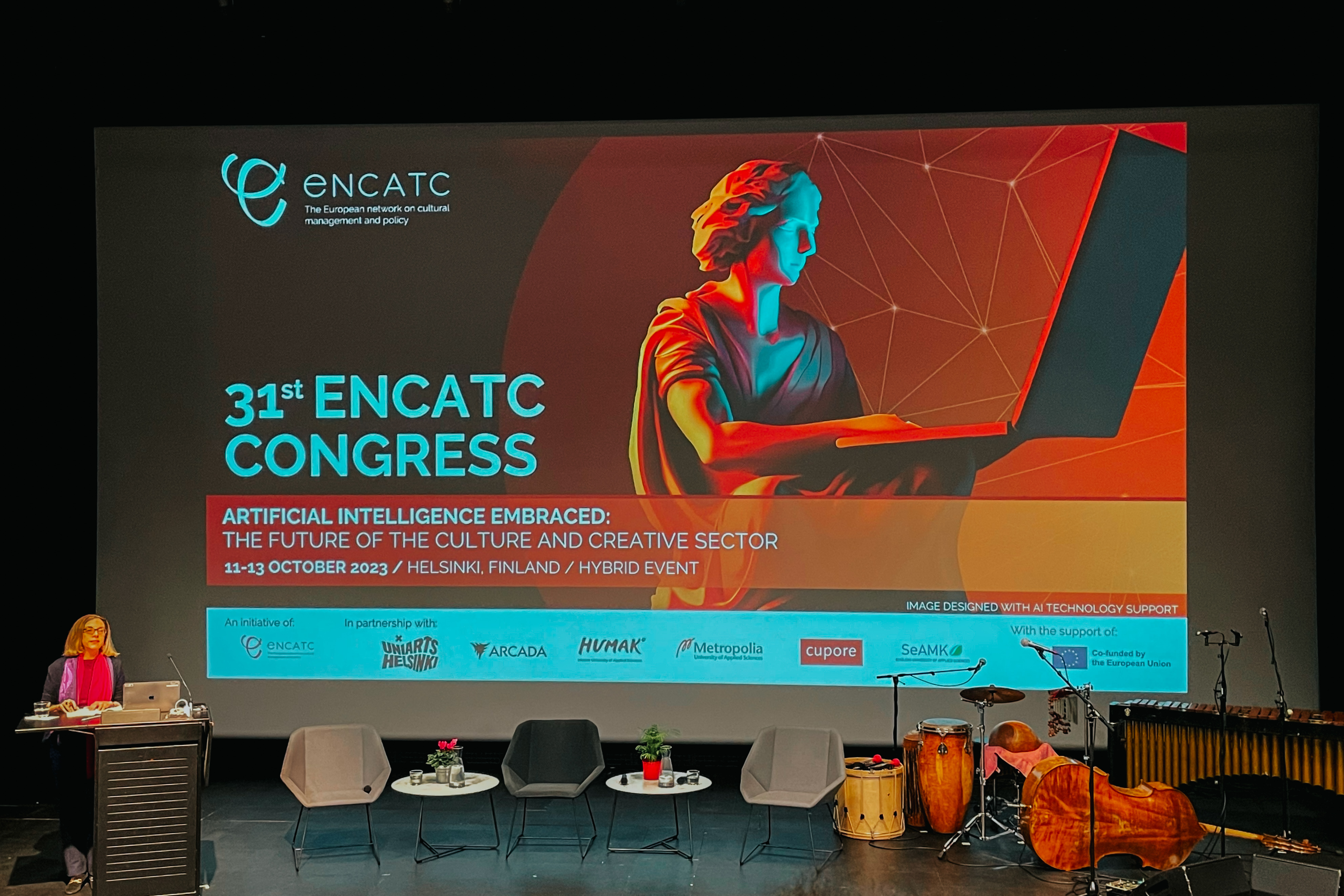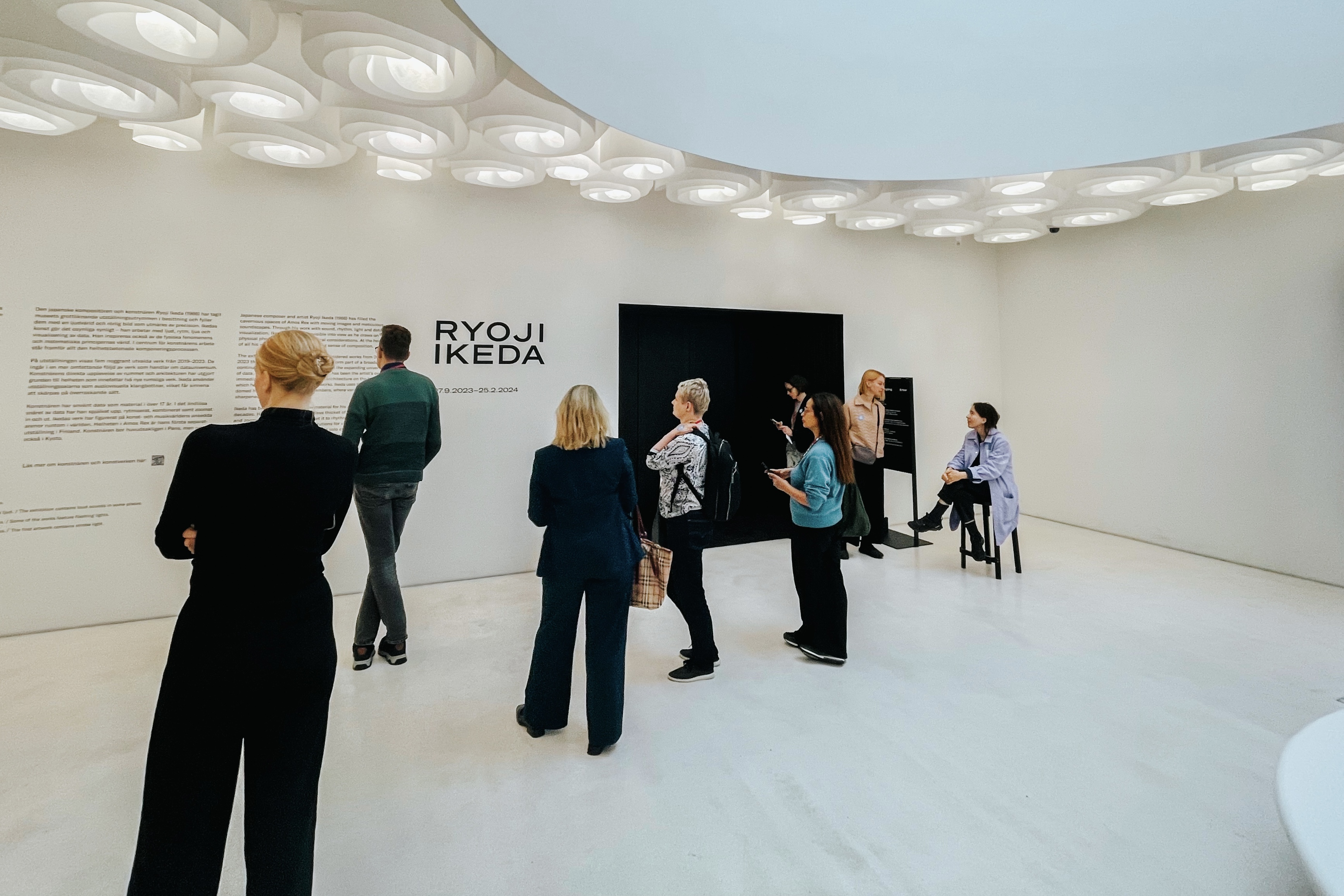Director of the Administration Rūta Stepanovaitė alongside Adviser at the Division of Culture and Arts Rita Obukaitė, Head of the Division of Monitoring and Analysis Radvilė Maskuliūnaitė, Adviser Marija Pečiulytė, Senior Analysts Karolis Jonutis and Martynas Tininis attended ENCATC International Congress on Cultural Management and Policy in Helsinki. Founded in 1992, ENCATC is now a broad European network for cultural management and policy, bringing together over 151 institutions and professionals from 40 countries.
This year’s topic was Artificial Intelligence Embraced: The Future of the Culture and Creative Sector. The Congress focused on advances in cultural management and policy approaches, research and practice in the field of culture. The three days were full of discussions, reflections, and sharing of knowledge on artificial intelligence, its impact, opportunities and challenges in the fields of cultural management and policy.
Artificial intelligence transforms the boundaries of art and culture
Head of the Division of Monitoring and Analysis Radvilė Maskuliūnaitė says that when it comes to artificial intelligence in the cultural sector and beyond, it is clear there are still more questions than answers. For this reason, the Congress brought together cultural researchers, practitioners, and policy-makers from all over the world to hold intense discussions on the impact artificial intelligence has on the cultural and creative industries and how it could change research or even cultural policy and management.

ENCATC International Congress on Cultural Management and Policy in Helsinki
“The discussions and presentations at the Conference made it clear that artificial intelligence is already actively transforming the conventional boundaries of art and culture. It places an artist at the crossroads of technology and creativity. It’s really intriguing to see what comes next,” said R. Maskuliūnaitė. The Congress included research sessions, a young researchers’ forum, as well as study visits to museums and galleries. The visits introduced cutting-edge artificial intelligence tools and technologies that can enhance learning, creativity, and cultural experiences. For example, virtual and augmented reality in education, curriculum development, language learning, etc. The event aimed to create a collaborative and inclusive environment promoting learning, innovation, and creativity.
This is not an apple
Senior Analyst Karolis Jonutis shares a few phrases that stood out at the Congress. One of them is that “artificial intelligence won’t replace you but people who know how to use it may.” Another phrase is “we are lucky - artificial intelligence will not destroy us, nature will.” Jonutis liked the idea that we need to foster a critical technology discourse, i.e., to not be afraid of new technologies because it is too late anyway, but to remain critical of the consequences of their use, especially in the legal framework, which is not keeping up with technology.
“I can’t help but think, there’s this ongoing argument over what art is. There used to be this view that conceptual art is more or less nonsense, and that real artists have to know the technique, the craft. Now that artificial intelligence is able to mimic all techniques perfectly, it’s conceptual art that is the most difficult, if not impossible, to mimic (though who knows how it might change in the future). For example, artificial intelligence is unable to understand that what’s depicted in Rene Magritte’s painting is not an apple,” reflects Karolis Jonutis.
What a brave new world
Adviser Marija Pečiulytė says that during the Conference, she opened LRT and saw the journalists' surprise in the headline: from 85% of schoolchildren who had heard of artificial intelligence, almost 80% were already using it in their education. “Lithuania is just starting to talk about it, but both at the Conference and in reviewing the trends of the last four years, it seems we are long overdue. Artificial intelligence has been around for some time now, especially in the creative sector,” said Marija.
She says artificial intelligence can help create new and unexpected artworks and make work more efficient. However, the tools it creates can also be used to achieve geopolitical goals and step up societal manipulation. This poses challenges to both the critical thinking of individuals and the life of society. For example, the Conference showcased how films are being created based on AI-analysed audience reactions to create more emotionally charged content. On the one hand, this is interesting, but on the other hand, will all the creative content now be further optimised to influence the viewer as much as possible? Some are enthusiastic, others cautious, but all agree that the world will change. “I kept thinking during the conference, ‘what a brave new world’,” said M. Pečiulytė.

ENCATC International Congress on Cultural Management and Policy in Helsinki
Artificial intelligence is here!
Senior Analyst Martynas Tininis argues that “artificial intelligence is here.” He says that representatives from the fine arts, interdisciplinary arts, music, and film sectors from the US and China attending the Congress gave dozens of examples of how the use of artificial intelligence is helping with mundane, simple tasks, allowing them to concentrate on higher-value-added work. For example, it can easily generate dozens of visual works and choose one to improve, as well as process thousands of different data, analyse categories, etc. “What I find the most memorable is the idea that there is no apocalyptic confrontation between artificial intelligence and humans. Culture and art experts stressed that the competition will be between humans. Those who will have artificial intelligence competencies and those who will not,” says Martynas.
The Congress also addressed the impact of artificial intelligence and digitisation on the cultural and creative industries — ethical issues like plagiarism, copyright infringement, and licensing. It also discussed the impact of artificial intelligence on the accessibility of culture and the arts, and how it could be used to preserve cultural heritage.
The new plutonium and the importance of critical thinking
Adviser at the Division of Culture and Arts Rita Obukaitė explains that artificial intelligence is an innovation that is rapidly taking over the world, including the cultural sector. It is a tool based on a large flow of information that not everyone is familiar with. And the unfamiliar often creates fear, which makes us freeze up and resent things, including both when it comes to technology and unfamiliar innovations.
She says the most used phrase at the Conference was “critical thinking.” R. Obukaitė states that an idea that stuck with her is that artificial intelligence is “the new plutonium.” It offers many opportunities, which we need to look at critically because they may also pose some threats. So, it is important to not fear innovation, use critical thinking, and embrace change — a new reality with artificial intelligence — because change creates value.
Speaking about the cultural sector, Rita Obukaitė argues that artificial intelligence can speed up processes but creators and artists need to engage their imagination even more. It is important to understand that artificial intelligence is about digital transformation. This means that every one of us, including artists, needs to transform together to turn artificial intelligence into a tool to foster creativity, originality, and help us create and achieve our goals.
Summing up the Congress, Director of the Administration Rūta Stepanovaitė said she is “curious to see the strategic drive for human-centred artificial intelligence take shape at the political level.” In other words, artificial intelligence is expected to eventually contribute to guaranteeing human rights and promoting diversity. However, R. Stepanovaitė notes that the regulations and international agreements necessary for such a policy are now “lagging behind technology,” as cases of artificial intelligence manipulating people’s images to create fake or even malicious messages have been documented, which raises reasonable doubts as to whether it will be possible to identify and regulate such cases in the near future.

M. Pečiulytė, R. Maskuliūnaitė, R. Obukaitė, K. Jonutis, R. Stepanovaitė, M. Tininis at the Congress in Helsinki